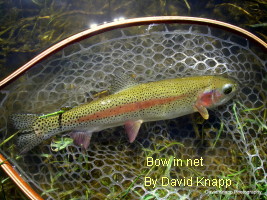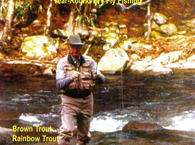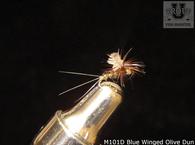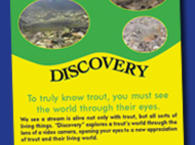
The Animas River starts high, above 9,000 feet, in the scenic and lofty San Juan Mountains which are a beautiful spur of the Rocky Mountains. In this area the competition for beautiful scenery is keen, however the Animas stands out above the competition for its breathtaking whitewater beauty. The Animas River starts in southwest Colorado near Silverton, Co. and flows 100 miles to meet the San Juan River in the desert of New Mexico.
The Animas River is a beautiful freestone fishery well populated with rainbows and browns and a few cutthroat and brook trout. Above Hermosa, the Animas is remote accessible only by hitching a ride on the Durango and Silverton Railroad, a narrow gage railroad that runs through the Animas Gorge. This portion of the Animas is small and populated mostly with small 8 to 10 inch rainbows.
The fishing begins to improve below Hermosa, where the river becomes much wider averaging over 100 feet wide, with long runs and deep pools that often hold respectable trout. As you approach Durango, the fishing continues to improve with the best fishing being available at Durango which is the approximate midpoint of the Animas.
Indeed, by far the best trout fishing is in and around Durango where the access is easy and the fishing is great. From the Rt. 160 Bridge for a distance of about three miles downstream, to an area known as the Purple Cliffs, the river has been named a Gold Metal Water. This section is protected with special regulations that call for artificial flies and lures. Anglers may keep 2 trout per day but they must be over16 inches.
The large boulders and rapidly moving waters in this section provide an excellent habitat for the trout that average from13 to 15 inches and with many over that average. The spectacular scenery, coupled with the light fishing pressure make this river special and a delight to fish.
After leaving the special regulations section, the Animas flows through Indian reservation land where anglers must have reservation fishing permit. After it leaves the reservation it flows into New Mexico where it meets the San Juan River.
Fishing the Animas River:
The Animas is surrounded by mountains that range around 13,000 feet and due to the confines provided by those mountains, it is greatly affected by snowmelt. Snowmelt usually brings high water starting in mid May and running through early July. The brown waters of the snowmelt cause the anglers to look toward the feeder streams for fishing during this time. However, the water is usually fishable by the first of July.
If the water is high, choose to fish near the banks as the trout will often migrate there to avoid the more rapid water for the purpose of conserving energy. Also, you may look for feeder streams, rocks or bends that will create good seams. Early in the season, the stream is best floated, but later it can be waded, but be sure to have a wading staff with you.
Spring:
Warm days in February, March and April, before snowmelt, will provide early season fishing. Blue winged olives, and midge nymphs, as well as sculpins and other streamers will work well in this timeframe.
Summer:
After snowmelt the water recedes and the great caddis hatches and the pale morning dun hatches will be the order of the day. The Animas River is especially well known for the abundant caddis hatches.
Fall:
Golden Stones imitations will work through early august and a second brood of blue winged olives will then start and continue through October. Terrestrials and streamers should definitely be included in your fly box during the fall. Be sure to use a sinking tip or weights to get the fly down into the deep pools.
The Animas can be found just north of the New Mexico border following Route 550 for much of its journey. The town of Durango is located at about the midway point. Easy access can be found where Rt. 160 crosses the river.
View Western USA in a larger map





